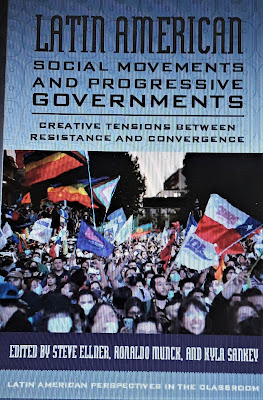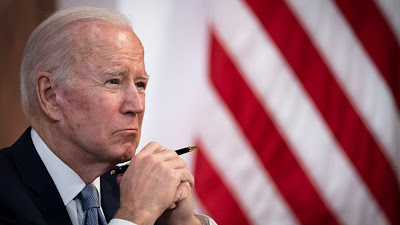Leftist Critics of Leftist Governments in Latin America Often Fail to Factor Hostility from Washington into their Analysis
What critics on the left of progressive Latin American
governments often pass over is that shortcomings have to be contextualized. Certainly,
criticisms are in order, and indeed are quite necessary, but the proposed
strategy has to consider conditions on the ground This is the main point I try to make
in my review of “The Impasse of the Latin American Left” by several outstanding
Marxists.
The Impasse of the Latin American Left by Franck Gaudichaud, Massimo Modonesi,
and Jeffery R. Webber. Duke University Press, 2022
Review by Steve Ellner
posted by NACLA: Report on the Americas
Can the firebrand Hugo Chávez with his embrace of "21st
century socialism" be placed in the same category as the pragmatic Lula? Writers
across the political spectrum make a sharp distinction between the two as well
as between other radicals like Bolivia’s Evo Morales as opposed to moderate
leftists like Uruguay’s Frente Amplio government. Anti-leftist writers like Jorge
Castañeda, as well as
some moderates, lauded Lula while denigrating Chávez (who Castañeda labelled the
"bad" or "populist" left) and his followers. Others further
to the left upheld the opposite position.
To a degree, the authors of The Impasse of the Latin
American Left, Franck Gaudichaud, Massimo Modonesi, and Jeffery R. Webber, can
be located in the opposite camp from that of Castañeda. The authors view the
radical 21st-century Latin American governments more favorably than those of
the moderate left. They credit Chávez for being largely alone in achieving certain
structural economic changes through expropriations. In contrast, Brazil,
according to the authors, became a “sub-imperial” power with 80 percent of its
exports going elsewhere in the region in the form of “industrialized products
of high or (mostly) medium grade technology,” largely in return for natural
resources and other primary products from its neighbors.
In spite of the obvious differences between the radicals and
the moderates, many authors place both groups of governments in the same
category and view them as part of the same phenomenon, referred to as the Pink
Tide. After all, Pink Tide leaders all followed a fairly nationalistic foreign
policy and privileged social programs targeting the non-incorporated sectors of
the population. Another common denominator is that, in the words of the
authors, Pink Tide governments “represent a significant break with
neoliberalism.”
Finally, Pink Tide governments, both those committed to
socialism and those which weren’t, were subject to considerable hostility and
threats from Washington and its allies. Brazil, one of the “moderates,” is an
example. The hearty reception received in the U.S. capital by former
federal judge Sergio
Moro, whose “clandestine collaboration with state prosecutors” led to
Lula’s jailing, is just one manifestation of Washington’s preferences.
Gaudichaud, Modonesi and Webber, while recognizing these key
differences among moderate and more leftist governments, argue that the theory
of “passive revolution” first formulated by Antonio Gramsci is applicable to
the entire Pink Tide phenomenon, even Venezuela. Viewed through this lens, the
Pink Tide governments are not “direct expressions” of either the dominant
classes or the popular sectors and thus enjoy a relative autonomy, but they are
dedicated to achieving a “reformist conservative project.”
In the framework of passive revolution theory, the feature
most emphasized in the book is the Pink Tide’s tight control and demobilization
of social movements. Popular movements were essential elements in the rise to
power of the Pink Tide: in the case of Brazil and Bolivia, Lula and Morales
emerged from them, and in Venezuela, Ecuador, and Argentina, they forced
presidents out of power. The book’s authors allege that Pink Tide governments
and parties ended up taming and disciplining social movements and in other
cases marginalizing them.
The authors point to a
“polarization” among analysts on the left regarding the Pink Tide phenomenon. On
the one hand, a pro group includes “unconditional and uncritical apologists.”
On the other are the critics. The latter camp, what the authors call “a rainbow
of critics from the left,” consists of the defenders of different isms,
including anti-capitalism, libertarian autonomism, environmentalism, and
postcolonialism (emphasizing Indigenous rights and communities). The
anti-capitalist critique, which most resembles the views of the authors, highlights
the Pink Tide’s class alliances with sectors of the bourgeoisie. Along these
lines, the authors point to the alliance between the older landed oligarchies
and agribusiness multinationals, which cemented the “structural continuities”
between the neoliberal years and the Pink Tide period. The most anti-Pink Tide
critique comes from the champions of “libertarian autonomism,” as represented
by Uruguayan author Raúl Zibechi,
who views the Pink Tide as a “step backward” and denies its anti-neoliberal
character.
The book’s critique of the Pink
Tide is thorough and backed by solid evidence. The errors and flaws of the Pink
Tide included the failure to significantly reduce the levels of corruption that
characterized the previous neoliberal period; the tendency toward
deindustrialization; the ecological damage that accompanied the extractivist model;
the failure to consult rural communities including Indigenous ones; and the failure
to respect social movement autonomy. Considering the book’s empirical strongpoints,
its shortcomings are not so much what it says but what it leaves out or
downplays.
First, in spite of its discussion
of the devastating impact of U.S. interventionism, the book fails to factor
imperialism into the analysis of the causes of the Pink Tide’s allegedly
erroneous policies and strategy. To take an extreme example, Washington’s
hostile actions against Venezuela turned into a virtual war on Venezuela
beginning with Obama’s 2015 decree declaring the nation a threat to U.S.
national security and then with the Trump administration’s suffocating
sanctions and support for military actions. In the face of these seemingly
insurmountable challenges, the authors would have had the Chavista governments
go on the offensive. Along these lines, they point out that the countries that
most confronted imperialism (i.e. Venezuela, Bolivia, and Ecuador) were
precisely the “ones that have restored revolutionary symbolism to prominence,”
thus implying a correlation between imperialist offensives and Pink Tide
radicalization. But the opposite could be argued, namely that in the face of
such ruthless actions by the world’s most powerful nation in history, a
defensive strategy was in order. This is precisely the current line of thinking
of Nicolás Maduro’s followers, some of whom point to Lenin’s New
Economic Policy (NEP) as an instructive precedent. In a war-like situation,
expectations of change need to be tempered by the realities on the ground, and
this reality needs to be taken into account in any analysis of demobilization,
the curtailment of democratic liberties, and extractivism, all at the center of
the authors’ concerns. To give one example: Venezuela’s failure to diversify
the economy was undoubtedly related to the imperative of countering
destabilization campaigns by stimulating active support among the popular
sectors. Ambitious social programs, more than economic structural transformation,
promised to achieve this in the short run.
Without going so far as to advocate
one policy over another, I would criticize the book for failing to address the
issue of how strategies have to be crafted on the basis of different conditions
on both international and national stages.
Second, as the authors show through
the prism of the theory of passive revolution, the Pink Tide leaders in power
attempted to control the social movements that were initially sympathetic to
their governments. What the authors largely pass over is that this exertion of
control was a tendency, but not one that completely demobilized the movements
to the extent that they lost all vitality or were completely alienated from the
government.
The most striking example is the
events in Bolivia that were partly underway at the time of the writing of the
book. Social movement activists and leaders who had adamantly opposed Morales’s
extractivist policies—even the one furthest to the left, Felipe
Quispe—joined forces in opposing the right-wing government of Jeanine Añez.
They forced new elections and supported the Pink Tide MAS party in the
presidential contests of October 2020. Another example is the active
support by the iconic Landless Workers Movement (MST), in partnership with
the Pink Tide’s Workers’ Party, for Lula’s candidacy in the upcoming
presidential elections slated for October 2022. Still another example is the
election of the leading figure of Venezuela’s commune movement, Ángel Prado, as a mayor
in 2021 on the ticket of the Pink Tide’s United Socialist Party (PSUV), in
spite of the bitter clashes between the two in the past.
Third, the authors are totally opposed to the Pink Tide
government alliances with “one or more ruling-class fractions,” but they fail to distinguish between
strategic and tactical alliances. The differences between the two couldn't
be greater. Some of these arrangements were, at least at first, tactical in
that they were pragmatically motivated with a short-term time frame. In
Venezuela and Bolivia, for instance, they were designed to counter violent and
economically devastating disruptions actively supported by powerful business
organizations in order to bring about regime change. In many Pink Tide
countries there was a practical consideration: why should government contracts
go to businesspeople who were set on regime change? So alliances were formed
with those businesspeople who, for whatever reason they may have had, did not
join the unprincipled and ruthless attacks on the government. In short, the
issue of alliances was a complex one. The authors recognize the diversity of
the alliances “according to different national contexts,” but fail to discuss
diverse government motivations, some of which were hardly opportunistically
driven.
Fourth, the authors are sympathetic to and frequently cite leftist
intellectuals, activists, and organizations, but ones that for the most part
lack a significant political following in their respective nations. Indeed,
they have failed to make inroads to fill the gap on the left created by Pink
Tide defeats after 2015. Argentine former president Cristina Fernández famously
pointed to the marginal status of many of the leftist critics of her
government, saying “You know what there is to my left? Nothing but the wall.” Gaudichaud,
Modonesi, and Webber recognize the weakness of those they support and partly
blame it on Pink Tide leaders for calling them “traitors” and “sham
revolutionaries.” The criticism is well founded as Pink Tide leaders in Venezuela, Ecuador, and elsewhere have displayed a degree of
sectarianism in their dealings with critics to their left.
Criticisms notwithstanding, the Pink Tide’s staying power over the last
two decades is impressive. Its recent comeback has been due to the electoral
gains scored by moderate presidential candidates who follow a pragmatic
approach rather than the hardline one proposed by the authors. This has
occurred in Mexico, Argentina, Bolivia, Chile, and Honduras (plus Andrés
Arauz's near victory in Ecuador).
The Impasse of the Latin American Left presents a valuable analysis that contributes to the understanding of the Pink Tide phenomenon, but, in my opinion, doesn’t tell the whole story. Errors and shortcomings have to be contextualized not by simply recognizing the existence of adverse conditions but by addressing the issue of the feasibility of options. To the authors’ credit, however, the theory of passive revolution effectively frames the key issue of demobilization which should be the point of departure of any serious analysis of the topic from a leftist perspective. The lessons of the Pink Tide, rigorously explored by the authors, have become increasingly relevant now that it is making a comeback—a comeback that can only be understood in the context of recognizing the well-conceived policies implemented by those governments as well as their errors.
Steve Ellner is a retired professor at Venezuela’s Universidad de Oriente
and is currently an Associate Managing Editor of Latin American Perspectives. He is
editor of Latin American Extractivism: Dependency, Resource Nationalism,
and Resistance in Broad Perspective (2021); his co-edited Latin
American Social Movements and Progressive Governments: Creative Tensions between Resistance and Convergence will
be released later this year.
https://nacla.org/impasse-latin-american-left-review





